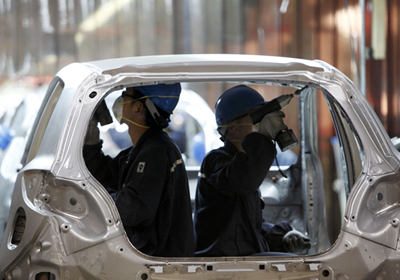Business
China's manufacturing at slowest for 17 months
By Huang Zhe, Chinmei Sung and Li Yanping in Taipei (China Daily)
Updated: 2010-08-02 12:58
 |
Large Medium Small |
|
 Workers operate the assembly line at the Changan Ford Mazda Plant in Nanjing. China's manufacturing grew at the slowest pace in 17 months in July as the government clamped down on property speculation and investment in energy-intensive and polluting factories, according to the Federation of Logistics and Purchasing. Qilai Shen / Bloomberg
|
The Purchasing Managers' Index (PMI) fell to 51.2 from 52.1 in June, the Federation of Logistics and Purchasing said on its website yesterday. That was less than the median forecast of 51.4 in a Bloomberg News survey of 15 economists. A reading above 50 shows an expansion.
A deeper Chinese slowdown could weaken a global recovery already constrained by the debt burdens and unemployment of advanced economies. While growth is cooling, China's full-year expansion may be as much as 9.5 percent, up from 9.1 percent in 2009, State Council researcher Zhang Liqun said.
"The Chinese economy is slowing down mainly due to the ongoing property tightening measures," said Lu Ting, a Hong Kong-based economist at Bank of America-Merrill Lynch. "Beijing will surely ramp up spending on public housing and other public works to stabilize growth."
The US economy, the world's biggest, grew at a slower pace in the second quarter as unemployment capped consumer spending, the government reported July 30. From the UK to Japan, government efforts to cut debt may weigh on demand after stimulus spending revived the global economy.
Heavy industry
Yesterday's PMI was the lowest since China's manufacturing stopped contracting in March 2009. An output index fell to 52.7 from 55.8 in June. A measure of new orders slid to 50.9 from 52.1. An export-order index fell for a third month, dropping to 51.2 from 51.7.
Of 11 sub-indexes, only the measure of employment gained, climbing to 52.2 from 50.6.
At Morgan Stanley, economist Wang Qing said the slowdown seemed concentrated in heavy industry, partly reflecting a government campaign to close inefficient businesses to meet energy-saving goals. This "does not necessarily reflect weakening in the underlying economic fundamentals", he said.
The PMI, released by the logistics federation and the Beijing-based National Bureau of Statistics, covers more than 730 companies in 20 industries, including energy, metallurgy, textiles, automobiles and electronics. China's industrial-output growth cooled in June by the most since 2008. Yesterday's data showed contractions in indexes of stocks of raw materials and finished goods, suggesting "a quite aggressive inventory correction" as business confidence weakened, said Tao Dong, a Hong Kong-based economist at Credit Suisse AG.
Investors may be betting that the government will alter policies if necessary to sustain the pace of growth. The Shanghai Composite Index climbed 10 percent in July. That was the biggest gain in a year and pared this year's decline in the benchmark to 20 percent.
Societe Generale SA cautioned last week that seasonal distortions in Chinese surveys raised the risk of a PMI below 50. Goldman Sachs Group Inc said that such effects typically drag down the July number and Australia & New Zealand Banking Group Ltd said the index had reached "a cyclical bottom" and may rebound.
Government measures this year, including trimming credit growth from last year's record $1.4 trillion and discouraging multiple-home purchases, have reduced overheating risks in the fastest-growing major economy.
Property prices
Growth dipped to a 10.3 percent annual pace in the second quarter from 11.9 percent in the first quarter and property-price gains have cooled from April's record. A moderation in growth "is a desirable result, which will lower expectations for further policy tightening", said Xing Ziqiang, a Beijing-based economist at China International Capital Corp.
Vale SA, the world's largest iron-ore producer, has a similar view, with Chief Financial Officer Guilherme Cavalcanti telling reporters on July 30 that the nation's expansion has moved to "a more sustainable pace".
China, the world's biggest exporter, has been buoyed this year by demand for shipments climbing to pre-crisis levels and even beyond.
"If exports hold up, China's slowdown should be moderate and not require a reversal of policy," Brian Jackson, an emerging markets strategist for Royal Bank of Canada, said. "But if weakness in the euro-area and the US does major damage to Chinese exports, Beijing will likely face pressure to deliver a renewed surge in investment spending."
UBS AG economist Wang Tao said late last month that economic growth could be cut by 2 percentage points in the second half of the year if the government shows "true resolve" in meeting its energy-efficiency target. The goal is in a five-year plan that has only months to run. Soured loans also have the potential to limit growth. Chinese banks may struggle to recoup about 23 percent of the 7.7 trillion yuan they've lent to finance local government infrastructure projects, a person with knowledge of data collected by the nation's regulator said last month.
Bloomberg News